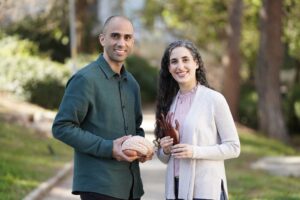Technion Biomedical research likely to bring novel rehabilitative techniques for patients with brain damage

Finger dexterity is a highly developed skill among humans, and it is essential for an enormous range of activities, including tying shoelaces, typing, playing the piano, and eating with a knife and fork. This ability is based on the unique anatomy of the human hand, but also on complex brain capabilities.
The brain controls finger dexterity through intricate mechanisms that have long challenged scientists from different fields. A study conducted at the Technion sheds light on this subject and is likely to lead to the development of innovative rehabilitation strategies, adaptable to individual patients’ needs. The research was led by Professor Firas Mawase, head of the Sensorimotor Neuroscience and Neurorehabilitation Laboratory in the Technion Faculty of Biomedical Engineering, and graduate student Gili Kamara. Their results were published in the journal Cell Reports.
In the course of their research, Prof. Mawase and Ms. Kamara developed a unique ergonomic device that enables in-depth testing of the strength of a patient’s fingertips. They used this device to analyze the ability to learn and generalize finger motor skills. The study’s focus was on two main types of motion: flexion (closing the fingers inward) and extension (opening the fingers outward) – two movements which are necessary for most of the fingers’ actions. Kamara recruited three cohorts of young, healthy subjects: one group that underwent only finger flexion training, one group that was trained only in finger extension, and a control group that did not undergo any training. She checked their dexterity in the direction that was learned as well as generalization in the other direction. The results revealed that finger extension training improved abilities in the other direction (flexion), but the opposite was not true: finger flexion training was not generalized in the other direction (extension). These findings indicate that the control circuits responsible for finger dexterity are interactive and partially transmitted, but are not symmetric in the two directions.
The results of this study may improve the techniques used for rehabilitating patients suffering from brain damage, including conditions such as Hemiparesis – a condition that harms mobility on one side of the body and leads to difficulty walking and grasping, loss of balance, etc.
The research was supported by the Israel Science Foundation (ISF) and the German-Israeli Foundation for Scientific Research and Development (GIF).
Prof. Firas Mawase is an assistant professor at the Technion Faculty of Biomedical Engineering. He completed his PhD at the Department of Biomedical Engineering at Ben-Gurion University of the Negev and a post-doctoral fellowship in the Department of Physical Medicine & Rehabilitation and Neuroscience at Johns Hopkins University School of Medicine. In his research lab, Prof. Mawase develops behavioral experiments on both healthy subjects and patients suffering from brain damage, using engineering and computational tools and functional imaging of the brain, in order to determine the neural base that controls motor skills in humans.
Gili Kamara made Aliyah from the United States in 2010. She completed bachelor’s and master’s degrees in the Technion Faculty of Biomedical Engineering, and worked in the industry for two years between degrees.
For the article in Cell Reports click here

